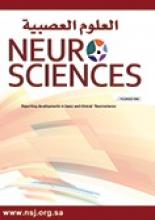Abstract
OBJECTIVE: The aim of this study was to show the effects of Khat on acute cerebral infarction (ACI), specifically regarding blood pressure, age and gender, and to open the door for further neurological research.
METHODS: We collected 358 patients with ACI, and 335 volunteers from Al-Thowra Modern General Hospital in Sana’a, Yemen, and Thamar General Hospital, Thamar City, approximately 100 km south of Sana’a. During a one year period, from February 2003 to March 2004, we conducted research regarding blood pressure, age, and gender related to the chewing or not chewing of Khat. We conducted a comparison between the ACI group and the volunteer group, using the SPSS 10.0 Chi-square statistical methods.
RESULTS: Results show that Khat increases blood pressure in patients with ACI. The gender-related effects show that Khat affects a greater percentage of males (74.6%) compared to females (25.4%), Khat chewers in the patient group showed a statistical significance of p<0.001. The 358 ACI patients had a mean age of 51.5 years old, while in the 335 normal individuals the mean age was 42.5 years old, showing a statistical significance of p<0.001.
CONCLUSION: Khat is a risk to blood pressure in ACI patients, with a statistical significance of p<0.001. Khat effects males more than females, and Khat chewers are more affected than non-chewers with a statistical significance of p<0.01. Khat also shows a significant relationship with age, affecting older persons (p<0.001).
- Copyright: © Neurosciences
Neurosciences is an Open Access journal and articles published are distributed under the terms of the Creative Commons Attribution-NonCommercial License (CC BY-NC). Readers may copy, distribute, and display the work for non-commercial purposes with the proper citation of the original work.






